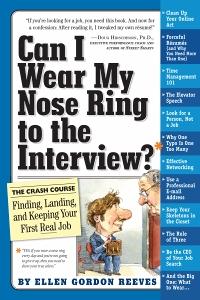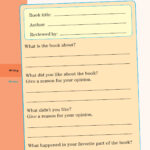In the coming two weeks, scores of young, hopeful baccalaureates will pass through the gates of their colleges and enter the entry-level world, many for the first time. The experience will be traumatic. Those new to the job market will trade in familiar indulgences like basking on the quad and sleeping in late for the new pleasures of sweltering under fluorescent lighting and staying at work late. Others will try to delay the inevitable and take a year or two off to travel the world, volunteer, or work part-time.
Regardless of the path the young B.A. might take, Ellen Gordon Reeves’s Can I Wear My Nose Ring to the Interview? is the essential guide to landing and navigating that first real job—which, face it grads, is just around the corner.
Here are some quick tips from Reeves’s book to help get you through this harrowing time:
The Organized Bird Gets the Worm
Even if you have never been organized in your life, you are going to have to get organized now. Undertaking a job search is a job in itself. Consider it training for the position you’re going to get. In fact, if a prospective employer asks you about your organizational skills and you don’t have much experience to draw from, you’ll truthfully be able to say: “Let me tell you how I organize myself. For this job search, for example, I set up a filing and tracking system…”
The “Experience” Section
Drawing a blank when it comes to the “experience” section of your resume? This is normal, especially if you’re just starting out in your professional life. I hear it all the time—“But I’ve never done anything.” This is usually untrue. What people often mean is, “I don’t think what I’ve done is meaning or important,” or they don’t see how the experience they’ve had relates to the job they want.
Bringing Your Resume to Life
Even the most expressive resume is no more than a bulleted list of accomplishments; the job of the cover letter is to make that list come alive—and in some cases, even to alter the way the reader perceives it. You must make the connections between your resume and the job at hand. If you haven’t had direct experience in the field of magazine circulation, for instance, you might draw the link to your resume by saying, “My experience working in the box office of our college theater offered me insight into the importance of seeking annual subscribers.”
Keep Your Skeletons in the Closet
Camouflaging real or perceived problems on your resume is one thing; dealing with them in an interview is quite another. An astute interviewer will attempt to discover your weaknesses, insecurities, and secrets. There’s nothing sneaky or shady about that—it’s just part of his job. Yours is to keep your skeletons in the closet. Obviously, there’s no reason to volunteer information about issues that will raise red flags (addictions, illnesses, family traumas, and so on), but you should also be prepared to sidestep or diplomatically address issues that do come up.
Fielding Other Offers
If you get an offer from one company while you’re waiting to hear back from another, you have two options. If you want the job that’s been offered to you, accept it. Notify the other employer that you have accepted an offer and are withdrawing your candidacy.
If you don’t want the job, find out the terms before you decline. You may be able to use that information to leverage an offer for the job you want. Call or email the place you haven’t heard from: “I’m taking the liberty of being in touch because I haven’t heard back about an application I submitted, and I really want to work at your company. I just received another offer, but I don’t want to accept it until I’m certain there is no possibility with you. If you can’t let me know now, may I have a sense of your hiring timeline?”
The Beginner’s Mind-Set
What can you do to make starting a job as easy as possible? The first thing is to know the logistics. When and where do you actually start? To whom should you report on the first day? If no one has told you, call the HR department or one of the people who hired you; don’t wait until Sunday night to figure out that you don’t know when and where you’re supposed to be on Monday morning.
Be Discreet
Don’t air your dirty laundry at work. It’s a small world. The colleague you confide in could end up being your boss one day. Does everyone need to know how you kicked your addiction or recovered from a serious eating disorder? Leave your personal problems, past and present, at home.
For more tips on finding and keeping your first real job, including resume and cover letter samples, check out Can I Wear My Nose Ring to the Interview?






No Comments